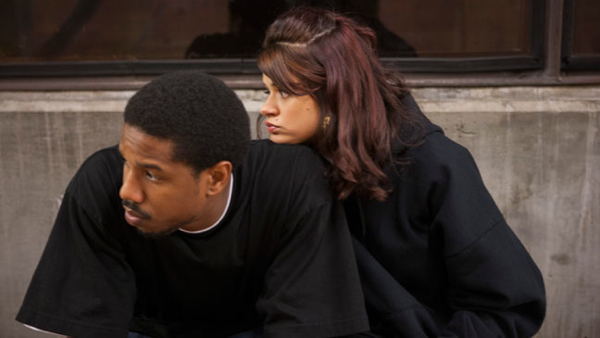Movie review by Greg Carlson
In the early morning hours of New Year’s Day 2009, 22-year-old Oscar Grant III was shot and killed by Bay Area Rapid Transit police officer Johannes Mehserle on the platform of the Fruitvale BART station in Oakland, California. The incident was captured on several cell phone cameras while the train full of witnesses idled, and the footage from one angle is used at the beginning of writer-director Ryan Coogler’s “Fruitvale Station.” Coogler’s decision to start with the disturbing documentation of the gunshot that took Grant’s life permeates the film’s quotidian business of following one young person’s last day with foreboding feelings of dread, melancholy, and regret.
As Grant, Michael B. Jordan navigates the man’s frustrating contradictions with a keenly applied understanding of the knots and errors that contribute to any life’s mosaic. Grant’s mostly uneventful schedule is given several dramatic conflicts by Coogler that capitalize on the fresh-start promises afforded by New Year resolutions. Grant tries to come clean with girlfriend Sophina (Melonie Diaz), the mother of their daughter, about romantic infidelity and the loss of his supermarket job. Additionally, we bear witness to Grant’s tendency toward prevarication and poor choices, as he struggles to leave behind the drug dealing that placed him behind bars in one of two prison terms served.
First-time feature filmmaker Coogler demonstrates maturity and confidence periodically offset by a few unnecessarily manipulative portents of Grant’s destiny. A scene in which Grant comforts a pitbull that has been struck by a vehicle flirts with both emotional artificiality and symbolic transparency. The narrative unity of several “it’s a small world” coincidences converging in one transit car is also a stretch, but the core of Coogler’s agenda, expressed by his thought in a New York Times interview with Joe Rhodes that “When you know somebody as a human being, you know that life means something,” is omnipresent in the film.
While some critics have negatively responded to Coogler’s affirming portrayal of Grant, “Fruitvale Station” is no different from any “based on a true story” historical dramas that, as narrative fiction, imagine and invent dialogue, details, and demeanors of “real” people being portrayed by talented actors. Coogler shrewdly and soberly turns “Fruitvale Station” into a meditation on the full range of one individual’s humanness instead of an inquiry into racial division, use of force principles, and police brutality and misconduct.
In the New York Post, Kyle Smith made several dubious assertions, including the statement that “videos of the shooting don’t support a claim of outrageous policing.” The validity of Smith’s comment depends upon one’s definition of “outrageous,” but plenty of eyewitness testimony and the videos taken that day corroborate the fact that Grant was unarmed and on the ground when Mehserle pulled the trigger (the defense team made the argument that the officer confused his Taser with his firearm). Coogler’s take on the chaotic prelude to Grant’s death unfolds with markers of urgency and unpredictability, identifying the filmmaker as an artist to watch and “Fruitvale Station” as one of 2013’s key movies.
